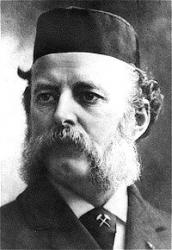Planning worship?
Check out our sister site, ZeteoSearch.org,
for 20+ additional resources related to your search.
- |
User Links
Search Results
O Thou, who art inspiring
Author: Rossiter Worthington Raymond (1840- ) Appears in 7 hymnals Hymnal Title: The Packer Hymnal Used With Tune: DWIGHT
O Thou, who art inspiring
Dear God, thy will be done
Author: R. W. Raymond Hymnal: Hymns and Tunes for Schools #222 (1908) Hymnal Title: Hymns and Tunes for Schools First Line: O Thou, who art inspiring Topics: Prayer and Aspiration Languages: English Tune Title: DWIGHT
Dear God, thy will be done
O thou, who art inspiring
Author: Rossiter W. Raymond Hymnal: Sursum Corda #589a (1898) Hymnal Title: Sursum Corda
O thou, who art inspiring
O thou, who art inspiring
Author: Rossiter W. Raymond Hymnal: Sursum Corda #589b (1898) Hymnal Title: Sursum Corda
O thou, who art inspiring
Rossiter W. Raymond

1840 - 1918 Person Name: Rossiter Worthington Raymond (1840- ) Hymnal Title: The Packer Hymnal Author of "O Thou, who art inspiring" in The Packer Hymnal Raymond, Rossiter Worthington, PH.D., was b. in Cincinnati, Ohio, April 27,1840. He graduated at Brooklyn Polytechnic, 1858, and also studied in Germany. He served in the Civil War of 1861-4 with the grade of Captain. Since then he has practised in New York as a consulting mining engineer. He was editor of the American Journal of Mining, and is a contributor to scientific literature. He has also written stories for children, a Paraphrase of Job, and some fugitive poetry. His hymns in common use include:—
1. Far out on the desolate billow. [God everywhere.] Written for the German tune, "Ich weiss nicht was soil es bedeuten," and published in The Plymouth Hymnal, 1894.
2. Morning red, Morning red. [Easter.] Written to the tune" Morgenroth," a German battle-song, and published in the American Book of Praise.
3. Now rest, ye pilgrim host. [Reviewing the Past.] This hymn is dated 1879, and was written for the 50th anniversary oi the Brooklyn Sunday School Union. It was included in The Plymouth Hymnal, 1891, No. 509, and, after revision by the author, in Sursum Corda, 1898, and other collections.
4. 0 Thou Who art inspiring. [Submission.] Appeared in The Plymouth Hymnal, 1894, No. 635, and later in other collections.
5. The God Who spann'd the heavens above. [Courage in Conflict.] "Written for my Sunday School, to be sung to the tune of the German patriotic song, ‘Der Gott, der Eisen wachsen liess' (by Arndt, p, 79, ii.), of which my first line is an evident and intentional imitation, though the remainder is not" (Author's MS.). It was published in The Book of Praise, the Sursum Corda, 1898, and others. It is sometimes attributed to "J. Clark,” but in error.
6. There dwelt in old Judaea. In Allon's Children's Worship, 1878.
Of the above Nos. 1, 2, 5 are in W. B. Bradbury's Clarion, 1867. Dr. Raymond is a Congregationalist, and is associated with the Plymouth Church, Brooklyn. [Rev. L. F. Benson, D.D.]
--John Julian, Dictionary of Hymnology, New Supplement (1907)
Rossiter W. Raymond
Joseph Barnby

1838 - 1896 Person Name: Sir Joseph Barnby (1838- ) Hymnal Title: The Packer Hymnal Composer of "DWIGHT" in The Packer Hymnal Joseph Barnby (b. York, England, 1838; d. London, England, 1896) An accomplished and popular choral director in England, Barby showed his musical genius early: he was an organist and choirmaster at the age of twelve. He became organist at St. Andrews, Wells Street, London, where he developed an outstanding choral program (at times nicknamed "the Sunday Opera"). Barnby introduced annual performances of J. S. Bach's St. John Passion in St. Anne's, Soho, and directed the first performance in an English church of the St. Matthew Passion. He was also active in regional music festivals, conducted the Royal Choral Society, and composed and edited music (mainly for Novello and Company). In 1892 he was knighted by Queen Victoria. His compositions include many anthems and service music for the Anglican liturgy, as well as 246 hymn tunes (published posthumously in 1897). He edited four hymnals, including The Hymnary (1872) and The Congregational Sunday School Hymnal (1891), and coedited The Cathedral Psalter (1873).
Bert Polman
Joseph Barnby


 My Starred Hymns
My Starred Hymns


